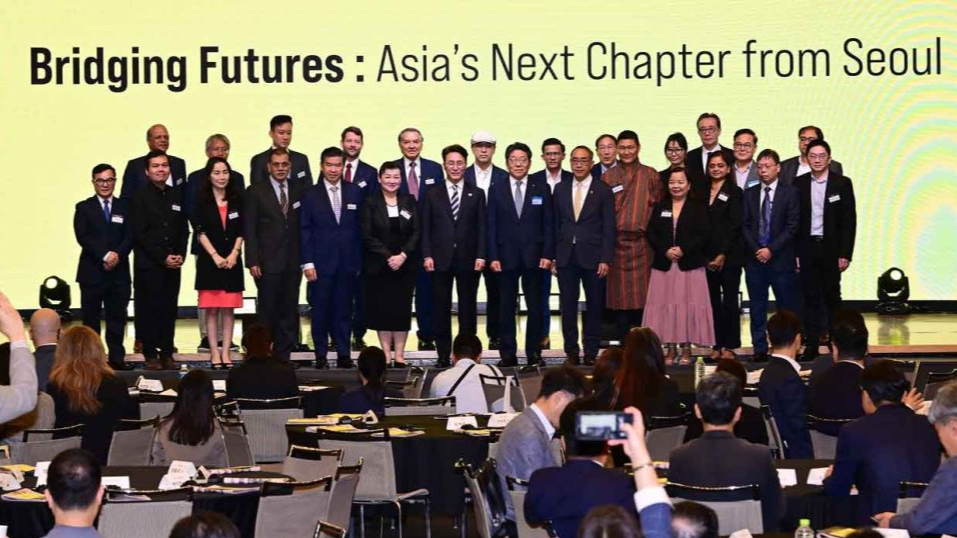
SEOUL – Asia’s future will be determined not by outside powers, but by its own voices and connections, leading editors across the region said on Thursday at The Korea Herald HIT Forum in Seoul.
More than 20 editors and publishers from 19 countries, members of the Asia News Network, joined policymakers and business executives at the Korea Chamber of Commerce and Industry to debate the region’s path forward.
Under the theme of “Asia Dialogue: Shifting Trade Order and Regional Solidarity”, the forum convened at a moment of unsettled global conditions.
In his congratulatory address, Prime Minister Kim Min-seok warned of converging crises.
“We are facing a confluence of challenges. A slowing global economy, intensifying geopolitical tensions, supply chain realignments and abrupt shifts in trade order,” he said. “At the same time, the AI revolution and the great energy transition present us with daunting but unavoidable tests.”
READ MORE: PM lauds ANN journalists’ role in safeguarding South Korea’s democracy
No country could navigate these challenges alone, he said. “Global solidarity and cooperation are imperative,” he added, stressing Asia’s pivotal role as the generator of nearly half of global gross domestic product.
This year’s session carried particular weight, coinciding with the early months of President Lee Jae Myung’s administration and coming just weeks before the Asia-Pacific Economic Cooperation summit in Gyeongju, North Gyeongsang province.
Offering his own congratulatory remarks, Thai Ambassador Tanee Sangrat said the “spirit of solidarity, mutual understanding and cooperation across Asia is more crucial than ever, enabling us to coordinate responses to shared challenges and foster resilience.”
“As the world’s leading economic bloc and one of the largest contributors to global growth, Asia has a significant opportunity to assume a leading role in reinforcing global connectivity and collaboration to serve shared interests. Asia, with its diverse economies and strong intraregional trade, could also be a source of economic balance and resilience,” he added.
Delivering the keynote address, Esther Ng, chief content officer of Malaysia’s The Star and chair of ANN, urged the region to take ownership of its narrative.
“Asia is not just rising. Asia has risen,” Ng declared. “We’re not just the backdrop for someone else’s narrative. We’re the authors of our own.”
She pointed to the region’s demographic strength and technological dynamism.
“With 4.7 billion people, more than half of the world’s youth and the fastest adoption of digital payments, Asia is not only the world’s factory, but now its brain trust. We are inventing, scaling and leading the industries that will shape the future from semiconductors to AI to green tech.
ALSO READ: Asia’s news chiefs convene in Seoul for solidarity talks
Choi Jin-young, CEO of Herald Media Group, framed the forum as an opportunity to confront disruptions to the global order head-on.
“Nations, companies and individuals are all seeking new survival strategies in this reconfigured order. This forum aims to spotlight how Asia can respond with solidarity.”
Two high-level panels explored Asia’s most pressing challenges. The first panel discussion, titled “Shifting Trade Dynamics in a Fragmented World Economy,” brought together Nguyen Minh, editor-in-chief of Viet Nam News, Wang Yu, business editor of China Daily, and Zakir Hussain, associate editor of The Straits Times.
The panel examined hurdles wrought by intensifying US protectionism. Vietnam has been hit with a 20 percent tariff on most exports to the US, while Singapore faces a 10 percent levy. Hussain noted that even at a lower rate, the decision was perceived as a “betrayal.”
Despite the headwinds, Minh and Hussain stressed that Asia remains “resilient,” moving toward deeper regional integration.
“I think many of the Asian countries are now invested in a network of FTAs (free trade agreements), especially in Southeast Asia,” Hussain said, urging businesses to leverage the “often-overlooked benefits” of frameworks such as the Regional Comprehensive Economic Partnership and the Comprehensive and Progressive Agreement for Trans-Pacific Partnership.
The second session, “Security Challenges and Middle Power Strategies”, featured former Korean Ambassador for International Security Affairs Lee Chung-min alongside editors from Bangladesh, Indonesia, and the Philippines.
ALSO READ: ANN chair: United by diversity, Asia must write its own story
Looking ahead to the APEC summit in Gyeongju, Ravindra Kumar, editor of The Statesman, asked how security and economic issues could be balanced.
Lee argued the two can no longer be separated. “You cannot decouple them anymore. Security, economics and technology are intertwined. If this APEC Summit achieves anything, it should be recognition that governments must change their mentality.”


